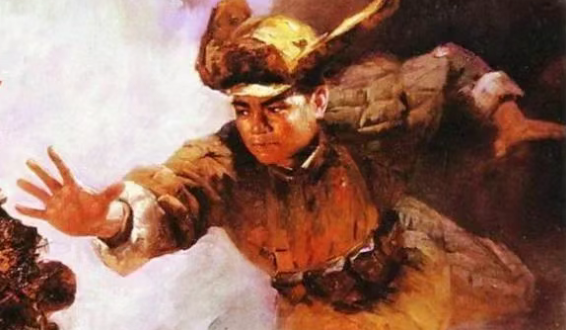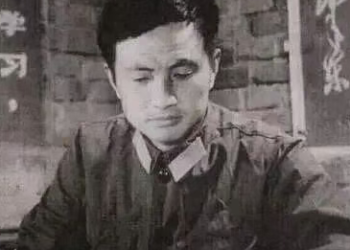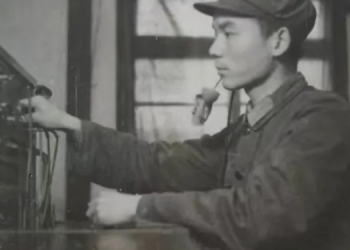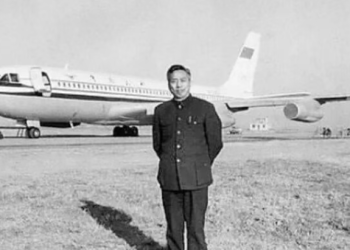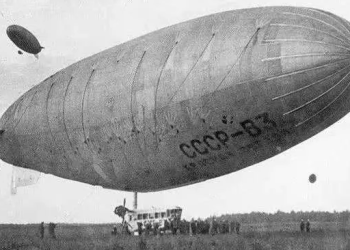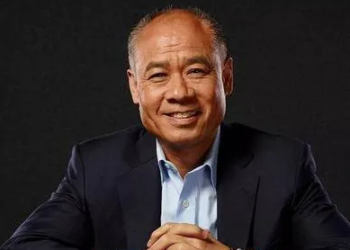On June 25, 1950, the Korean War broke out. In March 1951, Huang Jiguang, who had just turned 20, volunteered to join the army. Before leaving, he gave his mother a handkerchief embroidered with the words “Beloved Motherland.” He said, “Mama, I’m heading to the front lines soon. If you ever miss your son, just take out this handkerchief and look at it—your son will be right there with you.” That handkerchief was also the only keepsake Huang Jiguang left for his mother.
With deep love for his motherland and heartfelt longing for his mother, Huang Jiguang stepped onto the battlefield. He was assigned as a signaler to the 6th Company, 2nd Battalion, 135th Regiment, 45th Division of the 15th Army of the Chinese People’s Volunteer Army.
In April 1952, Huang Jiguang’s unit—the 15th Army—was deployed to the Wusheng Mountain position. One day, a film team brought the Soviet movie Private Aleksandr Matrosov. Watching the scene where the protagonist blocks a machine gun with his chest deeply shocked Huang Jiguang.
Huang Jiguang, whose original name was Huang Jiguang , wrote the only letter to his mother with the help of the unit clerk. In the letter, he revealed his heartfelt determination: “Now, for the needs of the people and the country, I stand at the forefront of glorious battle. For the happiness of all the families in our great homeland, I am determined to serve the people in combat—and I will not leave the battlefield without military merit.”
Just over five months after the letter was sent, on October 14, one of the fiercest battles of the Korean War broke out—the Battle of Triangle Hill (Shangganling).
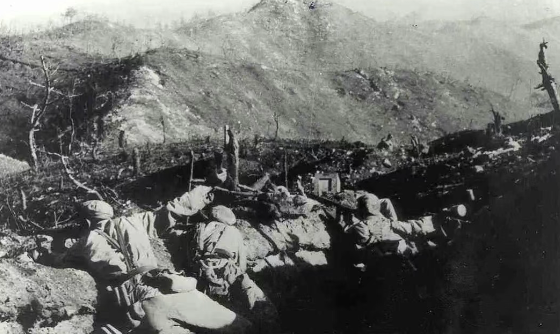
On October 19, the sixth day of the Battle of Triangle Hill, the Chinese People’s Volunteer Army had lost control of all surface positions. In order to reclaim the lost ground, Lieutenant General Qin Jiwei, commander of the 15th Army, ordered a concentrated counteroffensive: 44 heavy artillery guns and a full regiment of rocket launchers were deployed to attack the strategic Heights 537.7 and 597.9.
After a night of fierce and bloody combat, the Volunteers successfully recaptured all positions on Height 537.7 and most of Height 597.9. However, Position No. 0 remained firmly in enemy hands despite repeated assaults. As dawn approached, the situation grew urgent. The battalion operations officer, filled with anxiety, dispatched signalman Huang Jiguang to deliver a critical order to Company 6: the position must be taken before sunrise.
Second Battalion Operations Officer Zhang Guangsheng and Company Commander Wan Fulai led three squads in successive attacks. Tragically, the squads suffered heavy casualties and were nearly wiped out. In a pivotal moment, Huang Jiguang stepped forward. To allow Company Commander Wan Fulai to continue commanding, Huang volunteered to take on the demolition task. He formed an assault team with comrades Wu Shanyang and Xiao Dengliang, and they advanced toward the enemy stronghold.
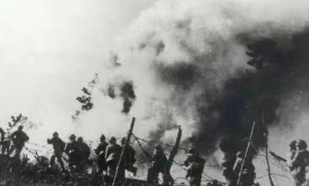
Huang Jiguang and Xiao Dengliang each successfully destroyed the enemy’s bunkers on the east and west flanks. Only the central bunker remained. Under a hail of machine-gun fire, comrade Wu Shanyang was killed, and both Huang Jiguang and Xiao Dengliang were struck down as well. Xiao could no longer rise, but Huang, dragging an injured leg, continued crawling forward.
Struggling toward the enemy bunker, Huang Jiguang hurled his last grenade with all his strength. The explosion only managed to collapse part of the bunker wall. Out of grenades and bleeding heavily, Huang crawled to the side of the bunker, propping himself up with his arms, and grabbed onto a sandbag with his left hand.
Looking up at his advancing comrades, Huang Jiguang used his own body to block the enemy’s machine gun.

The soldiers of the 6th Company followed the path that Huang Jiguang had carved with his life, storming the enemy bunker and unleashing a hail of bullets upon the American troops.
By dawn on October 20, 1952, the battle was over. It was then that his comrades discovered Huang Jiguang still lying atop the bunker. Both of his hands were tightly clutching the sandbags, and enemy bullets had pierced through his body, leaving a gaping hole the size of a rice bowl in his back.

On February 26, 1953, Huang Jiguang’s body was brought back to China and laid to rest at the Shenyang Martyrs’ Cemetery for the War to Resist U.S. Aggression and Aid Korea. On April 8, 1953, the leadership of the Chinese People’s Volunteer Army posthumously awarded him a Special-Class Merit and honored him with the title of “Special-Class Hero of the Chinese People’s Volunteers.”
When Huang Jiguang’s mother, Deng Fangzhi, received the news of her son’s death, she did not shed a single tear. She simply sat alone at the village entrance, staring silently in the direction her son had left… A few days later, she packed a bag once again—this time for her younger son, Huang Jishu—and sent him off to the Korean battlefield as well.
In April 1953, Deng Fangzhi attended the National Women’s Congress as a delegate. Chairman Mao Zedong, upon meeting her, said, “You lost a son, and I too lost a son. Their sacrifice was glorious.” After the congress, Chairman Mao invited Deng Fangzhi to his residence in Zhongnanhai, expressing a martyr’s father’s respect for a hero’s mother.

